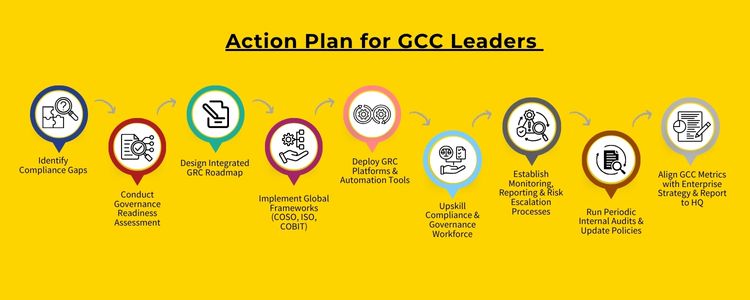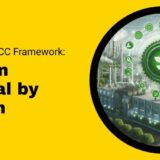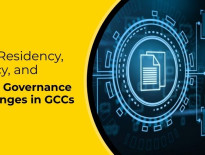In today’s dynamic business environment, the Global capability Center (GCC) in India has moved beyond back-office support to an innovation center that conducts main functions such as finance, human resources, IT, data science, risk management, and digital transformation. As the GCCs take up strategic operations rapidly, compliance and governance have become an important column for permanent development and credibility.
The stakes are higher than ever. Data Privacy (GDPR, India’s DPDP Act 2023), ESG reporting, and AI with increasing investigation around the regime and financial disclosure—GCC 3.0 should give priority to risk mitigation and transparency. In India, the GCC advisory partner, Inductus GCC, helps global enterprises to navigate these complications by implementing strong governance structures to suit the regulatory scenarios.
This blog designs the best practices to ensure that your GCC acts as a flexible, compliant, and reliable expansion of global enterprise.
GCC setup in India rises due to these five basic pillars. Here is a detailed description:
1. Talent Pool
- Skilled and specific workforce: India prepares more than 1.5 million stem graduates annually, which creates a huge reserve of talent in engineering, data science, and emerging technologies.
- AI and data analytics capabilities: More than 500,000 professionals AI are skilled in machine learning and cloud engineering, which makes India ideal for digital changes.
- Strong academic-industry links: Top institutions such as IIT and IIIT collaborate with global firms for joint research laboratories and innovative accelerations.
- Multilingual advantage: Indian professionals provide global communication abilities with an increase in flow and regional language support in English.
2. Cost Efficiency
- Saving up to 40%: Compared to Eastern European or Nordic countries, India provides significant savings in salary and operational costs.
- High value per dollar: The Firm not only reduces costs but also receives high innovation outputs through AI laboratories, IOT centres, and digital service lines.
- Flexible workforce model: The ability to score teams faster through flexible outsourcing and captive models supports tight business requirements.
- Costs of low real estate and infrastructure: Cities such as Bengaluru, Hyderabad, and Pune offer modern campuses at a fraction of European prices.
3. Digital Infrastructure
- Broader internet penetration: With more than 800 million users, India’s digital ecosystem always enables current cloud services and fast digital testing.
- Smart City and Data Centres: Data Hub and Smart Zone invested—such as Hyderabad’s Genome Valley and Gift City—digital.
- 5G and beyond: India’s 5G rollout and investment in 6G laboratories align with global telecom innovation efforts.
- Cloud-first Environment: Government and enterprise it are becoming cloud-elevated rapidly, making global integration easier.
4. Policy Support
- Digital India initiative: Promotes national digitization, AI, promotes public-private participation in e-governance and analytics.
- Startup India and Provide tax and financing assistance for research and development-based cooperation with GCC.
- Andhra Pradesh IT and GCC Policy: Incentives for the establishment of GCC with subsidy, fast-track approval, and workforce development.
- Stable FDI environment: streamlined approval criteria, 100% FDI and auxiliary industrial parks in most IT areas.
5. Market Access
- Strategic places: India’s proximity to South-east Asia provides direct access to emerging Asian markets.
- $3.5 trillion economy: one of the fastest-growing consumer grounds globally, ideal for testing and scaling of new products.
- Global distribution capabilities: Indian GCC manages operations worldwide for Nordic firms in time regions.
- Local insights for regional adaptation: It is important to make Nordic innovations (such as wind turbines or telecom gear) correspond to emerging markets.
frequently asked questions (FAQs)
1.
What is the DPDP Act, and why is it important?
India’s DPDP Act 2023 controls the operation of individual data. GCC to avoid punishment and ensure legal operations It is important to process Indian citizen data.
2.
How to support the GRC platform regime?
GRCs help to automate, manage risk, monitor compliance, and improve visibility for leadership.
3.
How can GCC implement the responsible AI regime?
By establishing moral AI guidelines, maintaining transparency, and auditing algorithm behaviour regularly for prejudice and compliance.
4.
What is the role of ESG in governance?
ESG structure promotes stability, moral governance, and social responsibility—the major factor in long-term GCC feasibility.
5.
How many times should the compliance audit be held?
A quarterly or half-yearly audit is the best exercise, but the frequency can vary depending on the industry, field, and risk.
Aditi
Aditi, with a strong background in forensic science and biotechnology, brings an innovative scientific perspective to her work. Her expertise spans research, analytics, and strategic advisory in consulting and GCC environments. She has published numerous research papers and articles. A versatile writer in both technical and creative domains, Aditi excels at translating complex subjects into compelling insights. Which she aligns seamlessly with consulting, advisory domain, and GCC operations. Her ability to bridge science, business, and storytelling positions her as a strategic thinker who can drive data-informed decision-making.



















